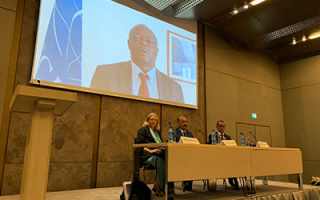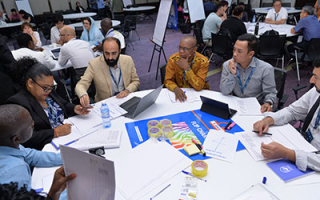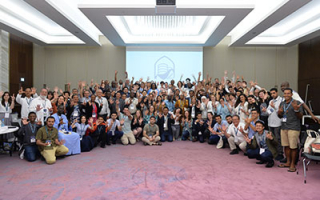The 3rd edition of the World Heritage Site Managers' Forum was held from 26 June to 4 July 2019, in Baku, Azerbaijan, in conjunction with the 43rd session of the World Heritage Committee. Over 60 site managers coming from 41 different countries participated in the Forum, to exchange knowledge and widen their networks. The host country of Azerbaijan provided financial support to 25 participants from SIDS (Small Island Developing States) and LDCs (Least Developed Countries) that greatly enhanced the diversity and balanced representation at the Forum.
ICCROM jointly organized the Site Managers' Forum together with the Republic of Azerbaijan and UNESCO World Heritage Centre, with collaboration from ICOMOS and IUCN, through the IUCN-ICCROM World Heritage Leadership Programme, funded by the support of the Norwegian Ministry of Climate and Environment.
The theme of the Forum this year was "Towards sustainable heritage management", very strongly linked to the World Heritage site where the Forum and Committee was hosted, the Walled City of Baku with the Shirvanshah's Palace and Maiden Tower. Icherisheher, the Administration of the State Historical-Architectural Reserve which is responsible for the conservation and management of the World Heritage site, provided valuable input to the Forum by allowing the group to work on the case study of Baku, envisaging a future for heritage management and sustainable development for the city.
The participants shared their challenges and knowledge in working as site managers on the ground, having constructive discussions on how best to implement the World Heritage Convention at site level. They shared their experiences of utilizing the various statutory tools of Reactive Monitoring and Periodic Reporting, while providing important feedback to the work of the Secretariat and the Advisory Bodies. The Forum covered an extensive range of issues from statutory processes of the World Heritage Convention, trends in state of conservation of World Heritage sites, sustainable development and implementing the 2030 Agenda in heritage management, methods of conducting impact assessments, addressing climate change issues and sustainable tourism. Interactive sessions were also organized to better understand the values based approach of World Heritage management by utilizing the adapted version of the Enhancing our Heritage toolkit. Using the city of Baku as a case study, participants worked together to identify the values and attributes, factors affecting the property and stakeholders and rightsholders.
This year, for the first time, the Site Managers' Forum came together with the Young Professionals' Forum in a joint session. This shared session on understanding how heritage management currently works, while projecting the future for the younger generation to take the lead, was a very important moment. All participants appreciated and shared the mutual benefit and responsibility of working together in respect.
Working on a common case study enabled the Forum participants to think more objectively about the management status and points of improvements that would be needed for their own respective sites. Such reflections shared within the groupwork provided the basis for formulating the Statement of the Forum that they wished to communicate to the World Heritage Committee but also to their respective States Parties.
The Statement recalled the World Heritage Capacity Building Strategy adopted in 2011, and called upon the national, regional and local level entities to actively implement the strategy. It highlighted the need for capacity building, required at all levels of site management, ranging through the different institutions and communities and including all those involved in the process operating at national, regional and local levels.
The Statement further emphasized the importance of empowering the site managers as critically important collaborators in the conservation and management of World Heritage sites, calling upon States Parties to include site managers into their official delegations to the World Heritage Committee. It acknowledged that communication is a fundamental component of capacity building and highlighted the importance of keeping the momentum of the Site Managers' Forum not only on the international scene, but also at regional and national levels.
The World Heritage Leadership Programme focuses on improving conservation and management practice of World Heritage sites, by promoting a people centred approach to the conservation of nature and culture, by working with sites and connecting people working on the sites.



